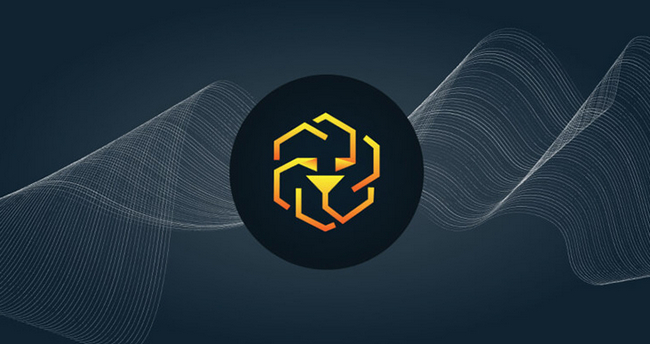-
 Bitcoin
Bitcoin $88,528.5821
1.60% -
 Ethereum
Ethereum $1,627.9897
-0.15% -
 Tether USDt
Tether USDt $0.9999
-0.01% -
 XRP
XRP $2.1034
-0.97% -
 BNB
BNB $605.4842
0.46% -
 Solana
Solana $140.0033
0.23% -
 USDC
USDC $1.0001
0.01% -
 Dogecoin
Dogecoin $0.1645
1.74% -
 TRON
TRON $0.2464
1.35% -
 Cardano
Cardano $0.6412
-0.26% -
 Chainlink
Chainlink $13.4496
-0.34% -
 Avalanche
Avalanche $20.4044
-0.88% -
 UNUS SED LEO
UNUS SED LEO $8.8459
-6.44% -
 Stellar
Stellar $0.2490
-4.17% -
 Sui
Sui $2.3130
2.12% -
 Shiba Inu
Shiba Inu $0.0...01257
-0.56% -
 Toncoin
Toncoin $2.9135
-3.52% -
 Hedera
Hedera $0.1725
0.70% -
 Bitcoin Cash
Bitcoin Cash $347.0066
1.87% -
 Hyperliquid
Hyperliquid $18.2549
2.01% -
 Litecoin
Litecoin $79.4705
-1.53% -
 Polkadot
Polkadot $3.7759
-3.42% -
 Dai
Dai $0.9999
-0.01% -
 Bitget Token
Bitget Token $4.4443
-0.71% -
 Ethena USDe
Ethena USDe $0.9992
-0.01% -
 Pi
Pi $0.6345
0.05% -
 Monero
Monero $216.0153
-0.06% -
 Pepe
Pepe $0.0...08131
3.42% -
 Uniswap
Uniswap $5.3950
-0.76% -
 OKB
OKB $51.0907
0.33%
How to get LEO coins? This article teaches you how to get LEO coins
By participating in the LEO ecosystem and engaging with high-quality content, users can earn LEO coins used for platform governance, rewards, and exclusive perks.
Oct 04, 2024 at 02:23 pm

How to Get LEO Coins
LEO (Leo Token) is the native utility token of the LEO ecosystem, a community-driven, blockchain-based social media platform. LEO coins can be used for various purposes, including:
- Upvoting and flagging content: Use LEO to upvote or flag posts and comments on the LEO platform to reward or discourage content creators.
- Earning rewards: Get LEO rewards for creating, curating, and interacting with content on the platform.
- Participating in governance: Use LEO to participate in the platform's governance, including voting on proposals and setting community policies.
- Purchasing services: Use LEO to purchase goods and services within the LEO ecosystem, such as premium content or website upgrades.
There are several ways to get LEO coins:
1. Publish High-Quality Content
Create valuable and engaging content on the LEO platform. Other users will upvote your posts, earning you LEO rewards.
2. Engage with Other Users
Interact with other users' content by commenting, upvoting, and flagging. Active participation in the community can increase your chances of earning LEO rewards.
3. Participate in Social Campaigns
LEO often conducts special campaigns and events to reward users for specific activities. Check the LEO website and social media channels for announcements of these campaigns.
4. Stake LEO
Hold LEO in your Hive Power, which increases your earning potential and voting power. You can earn LEO rewards for staking your LEO.
5. Buy LEO
Purchase LEO on cryptocurrency exchanges such as Hive-Engine, Poloniex, or Bittrex.
6. Earn LEO from Referrals
Refer others to the LEO platform and earn LEO rewards when they join and become active users.
7. Participate in LEO Missions
Complete specific tasks or challenges on the LEO platform to earn LEO rewards.
8. Delegate LEO
Delegate LEO to other users to earn a portion of their earnings.
9. Join the Orion Cloud
Become a member of the Orion Cloud, a group of LEO stakers who contribute to the platform's development and receive exclusive benefits, including LEO airdrops.
10. Airdrops
LEO may occasionally conduct airdrops, distributing LEO coins to users for specific events or milestones.
Disclaimer:info@kdj.com
The information provided is not trading advice. kdj.com does not assume any responsibility for any investments made based on the information provided in this article. Cryptocurrencies are highly volatile and it is highly recommended that you invest with caution after thorough research!
If you believe that the content used on this website infringes your copyright, please contact us immediately (info@kdj.com) and we will delete it promptly.
- British drug gang makes its own crypto to launch money
- 2025-04-22 18:50:12
- US Bitcoin ETFs Record Their Largest Daily Inflows Since January
- 2025-04-22 18:50:12
- Days before his 2025 inauguration, President Donald Trump announced the launch of his meme coin, a form of cryptocurrency.
- 2025-04-22 18:45:12
- XRP Community Figures Highlight Final Deadlines for SEC Decisions on Multiple Spot-Based XRP ETF Applications
- 2025-04-22 18:45:12
- Is It Time to Throw $1,000 Into Raydium Right Now? RAY Price Outlook
- 2025-04-22 18:40:12
- Mantra Burns 300 Million OM Tokens, Equivalent to 16.5% of the Total Supply
- 2025-04-22 18:40:12
Related knowledge

What is Ethereum’s Slashing mechanism and how to punish malicious behavior?
Feb 20,2025 at 03:08am
Key PointsOverview of slashingDifferent types of slashing in EthereumIncentives and consequences of slashingIdentifying and reporting slashed validatorsOngoing discussions and potential improvementsEthereum's Slashing Mechanism: Punishing Malicious BehaviorEthereum's slashing mechanism is an essential tool for ensuring network security and punishing mal...

What is the verifier node of Ethereum and how to become a verifier?
Feb 19,2025 at 06:00pm
The Verifier Node of Ethereum: A Comprehensive GuideKey Points:What is a Verifier Node?How to Become a Verifier NodeResponsibilities and Rewards of a Verifier NodeMinimum Requirements for Becoming a Verifier NodePotential Difficulties in Running a Verifier Node1. What is a Verifier Node?A Verifier Node is an independent entity on the Ethereum network th...

What is Ethereum’s staking, and how to participate and earn money?
Feb 19,2025 at 04:37pm
Key Points:Understanding Ethereum's Staking MechanismSteps to Participate in StakingBenefits and Rewards of StakingSecurity and Risk ConsiderationsTechnical Requirements and Hardware OptionsPotential Challenges and Troubleshooting TipsFAQs on Ethereum StakingWhat is Ethereum's Staking?Proof-of-Stake (PoS) is a consensus mechanism used in blockchain netw...

What is Ethereum’s DAO (Decentralized Autonomous Organization) and how does it work?
Feb 20,2025 at 03:12am
Key PointsDefinition and Structure of a DAOGovernance and Decision-Making in DAOsBenefits and Use Cases of DAOsChallenges and Limitations of DAOsWhat is Ethereum's DAO (Decentralized Autonomous Organization) and How Does It Work?Definition and Structure of a DAOA Decentralized Autonomous Organization (DAO) is an innovative governance and management fram...

What is Ethereum's multi-signature wallet and how to improve security?
Feb 20,2025 at 02:18pm
Key Points:Understanding the Concept of a Multi-Signature WalletBenefits and Drawbacks of Multisig WalletsRequirements for Setting Up a Multisig WalletStep-by-Step Guide to Generating a Multisig WalletImplementing Strategies for Enhanced Security1. Understanding the Concept of a Multi-Signature WalletA multi-signature (multisig) wallet in the Ethereum e...

What is Ethereum's oracle and how to provide data for smart contracts?
Feb 21,2025 at 01:30am
Key Points:Understanding the concept of oracles in EthereumExploring different types of oraclesDetailed guide on how to provide data for smart contractsAddressing potential challenges and considerationsWhat is Ethereum's Oracle?Oracles are crucial components in the Ethereum ecosystem, enabling smart contracts to access real-world data and off-chain even...

What is Ethereum’s Slashing mechanism and how to punish malicious behavior?
Feb 20,2025 at 03:08am
Key PointsOverview of slashingDifferent types of slashing in EthereumIncentives and consequences of slashingIdentifying and reporting slashed validatorsOngoing discussions and potential improvementsEthereum's Slashing Mechanism: Punishing Malicious BehaviorEthereum's slashing mechanism is an essential tool for ensuring network security and punishing mal...

What is the verifier node of Ethereum and how to become a verifier?
Feb 19,2025 at 06:00pm
The Verifier Node of Ethereum: A Comprehensive GuideKey Points:What is a Verifier Node?How to Become a Verifier NodeResponsibilities and Rewards of a Verifier NodeMinimum Requirements for Becoming a Verifier NodePotential Difficulties in Running a Verifier Node1. What is a Verifier Node?A Verifier Node is an independent entity on the Ethereum network th...

What is Ethereum’s staking, and how to participate and earn money?
Feb 19,2025 at 04:37pm
Key Points:Understanding Ethereum's Staking MechanismSteps to Participate in StakingBenefits and Rewards of StakingSecurity and Risk ConsiderationsTechnical Requirements and Hardware OptionsPotential Challenges and Troubleshooting TipsFAQs on Ethereum StakingWhat is Ethereum's Staking?Proof-of-Stake (PoS) is a consensus mechanism used in blockchain netw...

What is Ethereum’s DAO (Decentralized Autonomous Organization) and how does it work?
Feb 20,2025 at 03:12am
Key PointsDefinition and Structure of a DAOGovernance and Decision-Making in DAOsBenefits and Use Cases of DAOsChallenges and Limitations of DAOsWhat is Ethereum's DAO (Decentralized Autonomous Organization) and How Does It Work?Definition and Structure of a DAOA Decentralized Autonomous Organization (DAO) is an innovative governance and management fram...

What is Ethereum's multi-signature wallet and how to improve security?
Feb 20,2025 at 02:18pm
Key Points:Understanding the Concept of a Multi-Signature WalletBenefits and Drawbacks of Multisig WalletsRequirements for Setting Up a Multisig WalletStep-by-Step Guide to Generating a Multisig WalletImplementing Strategies for Enhanced Security1. Understanding the Concept of a Multi-Signature WalletA multi-signature (multisig) wallet in the Ethereum e...

What is Ethereum's oracle and how to provide data for smart contracts?
Feb 21,2025 at 01:30am
Key Points:Understanding the concept of oracles in EthereumExploring different types of oraclesDetailed guide on how to provide data for smart contractsAddressing potential challenges and considerationsWhat is Ethereum's Oracle?Oracles are crucial components in the Ethereum ecosystem, enabling smart contracts to access real-world data and off-chain even...
See all articles























































































